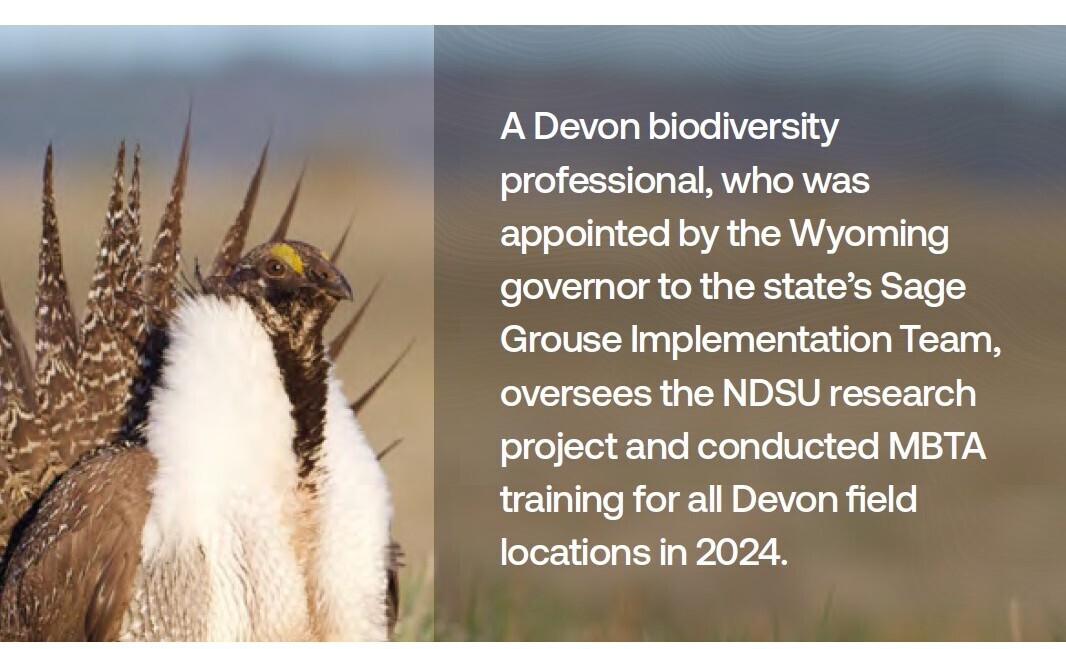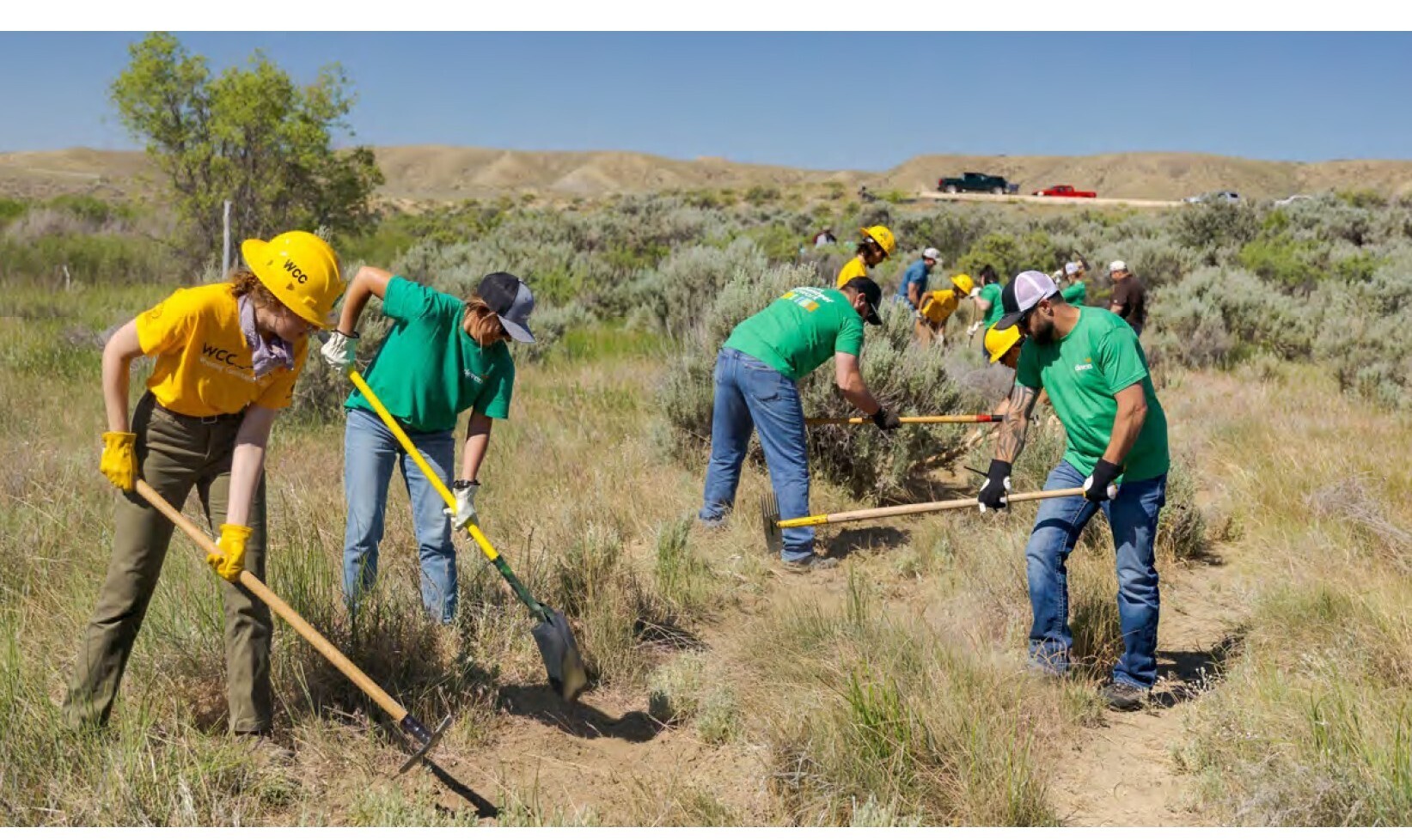Land Conservation & Biodiversity
Preserving our shared landscapes
Devon is committed to leaving our work locations in the same or better condition than we found them by being good stewards of the land, wildlife and habitat. To protect biodiversity, we work to minimize our operational footprint and impacts to the landscape, wildlife and their habitats, and cultural and historical resources. We believe that our commitment to land conservation and biodiversity will foster strong relationships with government agencies, nongovernmental organizations (NGO), academia and other stakeholders.
We operate in prairies, grasslands, deserts and forested areas, and on federal, state, tribal and private lands. To preserve our shared landscapes for future generations, Devon’s priority is to disrupt the land as little as possible and mitigate any impacts throughout the oil and gas production lifecycle. We also engage in activities to reclaim the lands we’ve disturbed once our work is complete.
In addition to operational impacts, the direct drivers of the loss of biodiversity value associated with our operations include climate change, land use changes, pollution of the environment and the spread of invasive species. All of these drivers play a role in reducing the availability of suitable habitat for native species, and impact the richness and diversity of native species. Devon takes steps to mitigate these risks through our land conservation and biodiversity practices that address impacts to species richness and diversity, including habitat degradation and destruction associated with land use changes, and impacts of invasive species. The Climate Change and Air Emissions sections address the broader climate change driver of habitat suitability and biodiversity loss. Additionally, preventing environmental pollution is addressed in the Waste Management and Spill Prevention sections.
Devon’s Biodiversity Council develops and implements enterprise-wide standards that avoid, minimize or mitigate ecological impact, and looks for opportunities to enhance biodiversity value of Devon-owned surface lands. The council and our biodiversity team work with our business units to integrate biodiversity improvements into our ongoing and future operations.
Devon’s enterprise-wide Reclamation Standard establishes minimum success criteria for all reclamation work. By setting minimum success criteria and reclaiming locations to the same or better condition than when we started work, we strive to be disturbance neutral. We track and assess our reclamation results with the goal of increasing native species diversity and richness in areas we once disturbed. Since the inception of the Reclamation Standard, Devon has admitted 207 well pads/access roads into the reclamation process, occupying a total disturbance area of 1,163 acres, with the goal of achieving the success criteria. To date, Devon has reclaimed a total of 420 acres at 106 sites across our basins.
To improve the accuracy of our reclamation process as we manage more acreage and collect more data, Devon is developing an integrated tracking and reporting system. The system will also notify our field professionals when acreage needs to be surveyed to help ensure it meets our minimum success criteria.
Assessing potential impacts up front
Devon’s Pre-Construction Environmental Protocol requires us to identify potential biodiversity issues up front for all surface activity across all of our business units. Biodiversity management is integrated into our process for selecting the optimal placement of our well pads, access roads and pipeline corridors. The protocol starts with completing a desktop environmental assessment in an area where we’ve staked out a well pad location. If we identify potential environmental impacts during the desktop review, we then conduct field surveys to facilitate our strategy to avoid, minimize and/or mitigate. These environmental assessments help identify sensitive environmental areas, such as threatened and endangered species habitats, wetlands and water bodies.
Devon complies with federal and state laws, tribal rights of way and other requirements. We work to meet all rules and regulations required to complete the permitting processes for disturbances. We also work directly with private landowners to address their concerns in a collaborative agreement.

Newly listed Threatened and/or Endangered species can impact our operations, especially where a federal nexus exists related to the Endangered Species Act (ESA). We review potential ESA species during the pre-construction environmental review well in advance of permitting activities and seek third-party surveys, if necessary, to develop alternative plans. Devon works to identify petitioned species listings early in a project for several reasons. First, early impact assessments can enhance our operational flexibility. Second, if we can timely address species listings, we can facilitate research that creates best available scientific data for the U.S. Fish and Wildlife Service (USFWS) to use in its listing decision. Devon’s IT team assigned to the Biodiversity Core Committee developed a system for early identification of potentially impactful petitions so they can be referred to our ecological staff for assessment.
Collaborative conservation efforts
Protecting the land involves building relationships with landowners, neighbors, industry groups, and state and federal agencies such as the U.S. Bureau of Land Management (BLM).
Land stewardship projects
We’ve shared our love of the land with college students as a sponsor of the Wyoming Conservation Corps (WCC) and its hands-on land stewardship projects since 2007. The students spend ten days doing work that the BLM considers necessary but lacks the funds to complete, such as removing and rebuilding fencing, removing invasive vegetation and maintaining trails. Devon hosted our traditional volunteer day for students in 2023 with the Buffalo BLM field office and undertook a WCC project with the Casper BLM field office in 2024.

Working on indigenous lands
Nearly all of our operations in North Dakota’s Williston Basin are located on the Fort Berthold Indian Reservation that is home to the Mandan, Hidatsa and Arikara (MHA) Nation, also known as the Three Affiliated Tribes.
Ongoing collaboration and mutual respect for people and the environment is our responsibility as a prudent operator and lessee of minerals owned by the MHA Nation. Devon incorporates representatives of the Three Affiliated Tribes into the planning process for our new pads and associated infrastructure. We avoid impact to archaeological sites and traditional cultural properties, and we mitigate impact to sensitive wildlife habitat.
Our development plans for drilling sites and pipeline rights-of-way in our Williston, Powder River and Delaware Basin operations often must comply with the National Environmental Policy Act and the National Historic Preservation Act because they are subject to review, comment and approval by the BLM and/or the Bureau of Indian Affairs.
Devon engages third-party archaeologists to identify cultural sites that may be eligible for the National Register of Historic Places and coordinate with Tribal Historic Preservation Offices to identify Traditional Cultural Properties. We avoid development on these sites. In North Dakota, archaeologists monitor our sites during construction for previously unknown cultural resources unearthed by construction activities, and none have been found to date. We believe this is the result of the precautions we take in the early stages of our projects.
